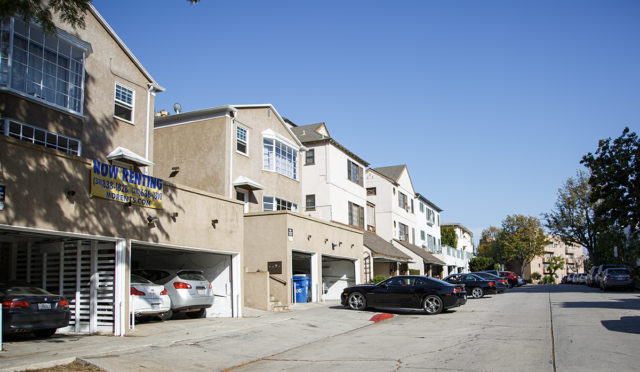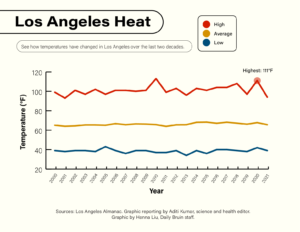This post was updated Jan. 16 at 10:04 p.m.
A UCLA study found low-income households in Southern California are more likely to have their power disconnected following extreme summer heat waves.
Residents turn on their air conditioning more frequently when the temperature exceeds 95 degrees Fahrenheit, increasing the cost of utility bills, according to the study led by Alan Barreca, an associate professor at UCLA’s Institute of the Environment and Sustainability.
“This is something that is very small and very frequent, but it will push people that are on the margin into financial distress,” said Barreca.
Barreca added that as extreme heat days increase in frequency over time due to climate change, cooling expenses can build up and lead people to miss their due dates for electricity bills.
The researchers wanted to see if there was a causal relationship between hot weather and outcomes of energy bills and power disconnections, said Paul Stainier, an environment and sustainability doctoral student. He said this research could be used to understand why certain households become unable to pay their bills.
Stainier said if bills aren’t paid by their due date, which is usually within 53 days of receiving the bill, a power cut-off occurs.
Kelly Turner, an associate professor of urban planning, said the state of California requires all landlords to provide heating to tenants, but does not mandate the same for air conditioning.
“As the climate changes, clearly that’s going to become more and more of an issue, because dwellings are going to be unlivable under extreme heat conditions,” Turner added.
Turner said current solutions act as if extreme heat days are rare emergencies; however, they are becoming more common.
Cities in Los Angeles County broke heat wave records from 1950 last summer, reaching up to 112 degrees Fahrenheit, according to the LA Times. Air conditioning will become increasingly important as new temperature records continue to be broken, said Stainier.
“These extremely hot conditions are going to become more and more frequent,” Turner said. “We’re applying an emergency framework to something that’s no longer an emergency. It’s just a reality of summer conditions, especially in Southern California.”
Under Southern California energy company policy, power can’t be disconnected if the temperature reaches 100 degrees, Barreca said.
Barreca also said the policy solution to this issue would need to be multifaceted and should protect people from extreme heat, grant access to air conditioners, and manage high energy bills.
Better insulation in homes would allow people to run their air conditioning less and therefore pay less, Barreca said. An additional potential policy would focus on an automatic discount on energy bills following extreme heat events, he said.
Turner said communities of color and low-income households tend to live in the hottest places in cities, because of less access to cooling and urban design choices with less vegetation and more asphalt. She added that one solution would be to set a cooling standard to require landlords to have cooling technology, whether that be air conditioning or some other technologically advanced cooling system.
The tradeoff between protecting against hot weather and spending more money is not necessarily a conscious choice that households are making, Stainier added.
Barreca said there is generally a lot of pushback on giving money to low-income households because of the fear of incentivizing energy consumption. He added that studies have shown people don’t consume a lot more energy if energy prices are lower.
Barreca noted that there needs to be more data about disconnection statistics across the United States in order to see more trends.
“Housing is connected to other aspects of life,” said Turner. “We need to have … housing policies that encompass extreme heat. They need to be in conversation with other policies.”





Comments are closed.